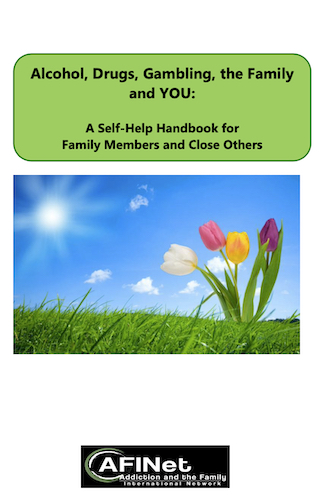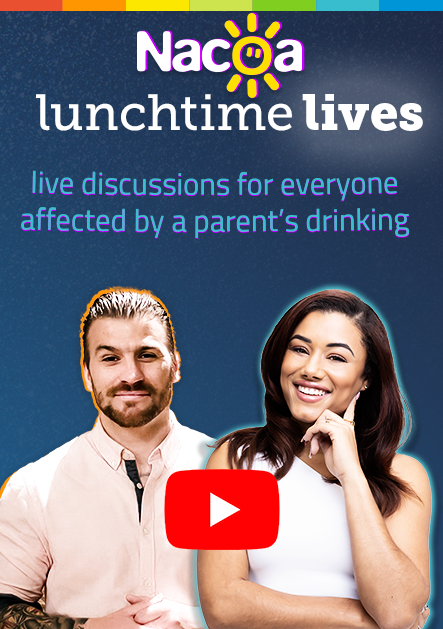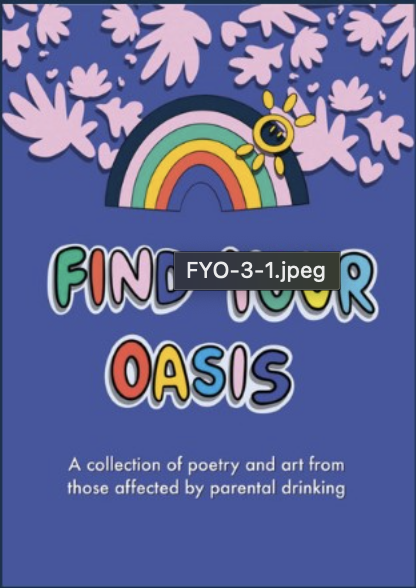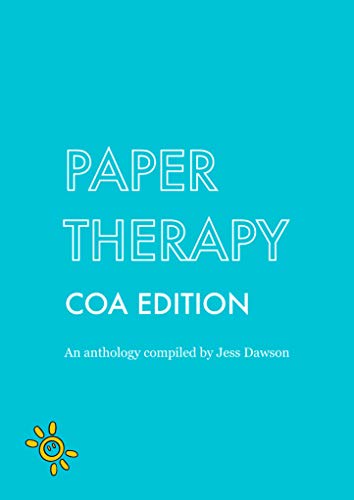FAQs
Below are some frequently asked questions about alcohol problems and how parents’ drinking affects adult children.
If you have a question that isn’t listed, please ask us. For questions about contacting Nacoa, see Helpline FAQs.
If you are worried about someone else who is affected by their parent’s drinking, you may also find it helpful to look at Concerned others & professionals.
Why do people drink alcohol (even when it makes them ill, cry, angry, do silly things)?
People have drunk alcoholic drinks for thousands of years. There are many reasons people drink. Some people like the taste. They may drink at parties and other social events, often with family and friends. They may drink to ‘fit in’ or through peer pressure. Some people like how it makes them feel or drink to get drunk and ‘out of it’. Sometimes people use alcohol to unwind or to try to cope with problems such as job, money or relationship worries or bereavement.
Alcohol is a drug containing ethanol made from fermenting fruit or grains. Drinking alcohol affects the brain and nervous system, altering people’s mood and behaviour. Although alcohol is a depressant, at low doses, it can initially have some stimulant effects—increasing people’s heart rate, making people feel happy and more confident, reducing anxiety, and for some people, increasing aggression.
Sometimes people do not realise how much they have drunk and end up intoxicated without intending to. Alcohol can cause memory blackouts, meaning people don’t remember silly, embarrassing or other things they have done when drinking.
People continue to drink because the positive feelings they experience outweigh any negatives, such as being sick or getting a hangover.
Learn more about alcohol at Drug Science.
When does someone have a drink problem? Is my parent an alcoholic?
If you feel affected by someone else’s drinking, there could be a problem. The following questions look at what alcoholism is and why people continue to drink even when it’s affecting their lives and those around them. You may also find it helpful to look at our Other Person Diagnosis sheet.
Remember that Nacoa is here for everyone affected by their parent’s drinking. We focus on the impact it is having on you, whether they’ve been diagnosed as having a problem or not.
What is alcoholism?
When people regularly drink too much, they can develop an alcohol problem or addiction, often referred to as alcoholism. The medical term for this is an alcohol use disorder.
Alcohol problems are like an illness where people have lost control over their drinking. They may only mean to have one or two drinks but end up drinking more. Nobody sets out to have an alcohol problem. They often start drinking for fun and end up drinking to feel ‘normal’.
They develop a compulsion to drink, spend increasing time drinking, thinking about drinking, and recovering from drinking, often with unsuccessful attempts to stop or cut down.
People with alcohol problems can become physically dependent on alcohol, needing to drink to get rid of unpleasant withdrawal symptoms. They usually need help to tackle problem drinking. When people are physically dependent on alcohol, it can be dangerous to stop drinking suddenly.
How does my mum/dad manage to drink all day every day?
People develop tolerance to alcohol and need to drink more to get the same effect.
When not drinking, they experience withdrawal symptoms, including anxiety, shaking, sweating and seizures, which can be relieved by drinking alcohol. This can lead to a vicious cycle where people become physically dependent on alcohol and need to drink in order to ‘function’ or feel ‘normal’.
What is denial?
Denial often goes hand in hand with addiction and is not the same as lying. The drinker believes alcohol is the solution to problems and doesn’t see their drinking as problematic. They may blame other people for their drinking and find ways to excuse their behaviour.
Denial can spread into other areas of life as a way of coping and hiding problems. Sometimes family members can also be in denial as a way of coping, pretending the problem doesn’t exist or keeping it hidden from the outside world.
Can drinking too much be harmful?
Too much alcohol can harm the body and brain. Drinking alcohol can:
- cause accidents and injuries
- lead to health problems such as malnutrition, liver disease, heart disease, some cancers, and diabetes
- weaken our immune system, making it harder to fight off illnesses and infections, such as pneumonia and sepsis
- weaken our bones, increasing the risk of fracturing or breaking them.
- affect our mental health and lead to problems such as depression, anxiety and suicidal thoughts
- in pregnancy, damage the unborn baby, and lead to Foetal Alcohol Spectrum Disorder
Why does my parent continue to drink when they know the harm it is causing?
When someone has an alcohol problem, they continue to drink even when it’s adversely affecting their lives and those around them. Repeated exposure to alcohol can change people’s brains, reducing their ability to control the impulse to consume it.
Drinking can end up taking priority over everything, even those they love. It can lead to health, financial and relationship problems.
Often the person drinking doesn’t realise they have a problem. Even if they become aware something is wrong, they may not think it has anything to do with their drinking. They see drinking as the solution to problems and excuse or justify their behaviour. They may blame other people or other problems in their life.
Whatever anyone says, you are not responsible for your parent’s drinking, and it’s not your fault.
It’s painful to acknowledge when our behaviour hurts others, and it’s the same for people with drinking problems. If the drinker does notice the effect on their family, they may drink more to cope with the guilt and shame.
It is hard for family members to see people keep drinking when it’s hurting them and everyone around them. It’s OK to love your parent whilst hating their drinking and behaviour.
My parent has a drink problem, are they going to die?
Excessive alcohol use can be harmful and sometimes fatal. Knowing someone is drinking heavily can be worrying.
The idea of a parent dying is scary for everyone, and when alcohol is involved, it can bring up a range of difficult feelings.
You might feel sad, angry, scared, embarrassed, lonely or numb. Sometimes people feel it would be better if their parent did die as it would end their suffering, but then feel guilty for having these thoughts. Others feel they have lost their parent already, and may have to grieve for a second time when their parent dies.
When families can’t talk openly about issues, it can make it harder for them to support each other at difficult times. The death of a parent with alcohol problems may create tension between surviving family members.
If your parent has died, you may find it helpful to talk to Nacoa and read our Coping with the Death of a Parent booklet.
Why do people become alcoholics?
Alcohol problems can affect people of all ages and from all walks of life. People don’t set out to have a drink problem. They often start drinking for fun or to try to cope with problems in their lives. They end up losing control over their drinking and needing alcohol to feel ‘normal’.
There are many research studies looking at why some people become dependent on alcohol and others don’t. Various factors play a part, including genes, how people react to stressors, learned behaviour, changes in brain function, and more.
Is there a cure for alcoholism?
Alcohol problems are treatable – people can find help for their drinking and go on to live healthy lives.
For some, this is possible by not drinking alcohol at all. This is often referred to as ‘being in recovery’. Many do this with the help of self-help groups, such as Alcoholics Anonymous.
Some people need medical help and go into treatment or rehab, where their physical and psychological dependence is addressed over weeks, months and sometimes years. Some rehab centres offer a residential programme, followed by supported living before returning to the family. Others offer daily programmes where patients continue to live at home.
Funding for treatment is sometimes available from the local authority following a referral by the GP. Other treatment programmes are fee-based. Nacoa will happily research support options to give you an idea of what might be available for your parent(s).
Why can’t our doctor do anything about it?
Doctors can offer advice and suggestions, but the person with the drinking problem has to accept that they have a problem and want help. No one can be forced into treatment.
This may be difficult for family members to accept, but talking to the GP can still be helpful to find support for you. For information on where people can get help for their drinking when they are ready and willing, see Help for People with Alcohol Problems.

Should I hide, pour away or water down their alcohol?
You can’t control someone else’s drinking. Pouring away, watering down, or hiding alcohol may make things worse, and the person may become angry, aggressive or more secretive.
How can I stop someone from drinking?
When someone has an alcohol problem, they have lost control over their drinking. Denial is a common feature so someone may have a drink problem and not even realise it. Help is available, but the person drinking has to accept they have a problem and want to stop. It has to be their choice to access help when they are ready.
Your parent’s behaviour is not your fault and you can’t control their drinking. Look after yourself and avoid getting into an argument with your parent when they are drinking. Find support for you and make your wellbeing the main priority.
What can I do to help my parent?
Spend some time finding out about alcohol problems. You don’t need to be to an expert but having an understanding can help you feel more prepared.
You could also find out about support available for people with alcohol problems so that if your parent becomes receptive to seeking help, you have information to hand. Nacoa will happily research relevant sources of support. However, please remember that it has to be their decision to access help. It is not your responsibility to make them address their drinking.
What else can I do?
To be there for other people, we must look after ourselves. You are important too.
Find time for things you enjoy. Sometimes worries can take over, and taking a break, even if just for a short while, can help you de-stress and gain perspective.
Get support for yourself: talk to a friend or relative you trust, contact the Nacoa helpline, or go along to a support group for family members affected by someone’s drinking. You cannot change your parent’s behaviour, but you can change how you feel about yourself.
It can sometimes help if the person drinking sees the consequences of their behaviour, so consider not covering up or clearing up for them. This can also be less exhausting for you. You are not responsible for how someone else behaves.
How can I broach the topic of a friend or relative’s drinking?
Try talking when they are least likely to have been drinking and you are in a safe/appropriate place. Try not to judge or be confrontational. Keep feelings in the first person and focus on how you feel.
Please don’t expect too much, and remember how powerful denial can be; the person drinking often believes alcohol is the solution to problems and doesn’t see their drinking as problematic. For suggestions, see Talking to Someone About Their Drinking.
How many people are affected by their parents’ drinking?
Research suggests that 1 in 5 children in the UK live with a parent who drinks hazardously. You can be affected by your parent’s problems even if you are not living in the same house or if they no longer drink.
The effects of parental alcohol misuse don’t just disappear once children reach 18. Millions of adults in the UK are still affected by their parent’s drinking or the knock-on effects of growing up in a home where alcohol was a problem. For more information about the scale of the problem, see Research.
How do parental alcohol problems affect the family?
Alcohol problems affect the person drinking and everyone around them, including family, friends and colleagues.
As the alcohol-dependent parent organises their life around alcohol, the family also focuses on the drinking; this can leave other family members, particularly children, feeling unimportant and confused.
Living with alcoholism can be chaotic and lead to other problems. Witnessing violence, mood swings, and unpredictable behaviour often leads to feelings of fear, anxiety, guilt and shame. Families affected by alcohol problems are also more likely to experience a shortage of money as alcohol becomes the priority over basic needs.
Children of alcoholics are more likely to suffer from low self-esteem, depression and consider suicide, often turning to drink, drugs and addictive behaviours, such as eating disorders, to cope. The effects can persist into adulthood. Despite this, many grow up to lead happy and healthy lives. Awareness of the problem and feeling supported can make a huge difference.
See information to learn more about how alcohol problems affect the family.
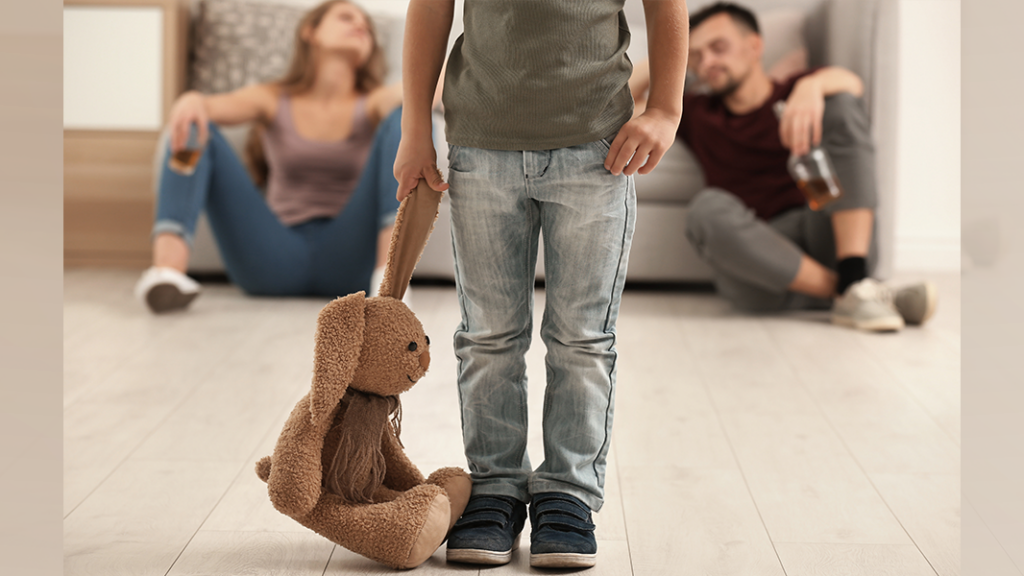
What is Foetal Alcohol Spectrum Disorder (FASD)?
Drinking alcohol during pregnancy can affect the baby’s development and cause Foetal alcohol spectrum disorder (FASD). FASD leads to lifelong mental and physical problems, including problems with:
- movement, balance, vision and hearing
- learning, such as problems with thinking, concentration, and memory (FASD is the most common cause of intellectual disability)
- managing emotions and developing social skills
- hyperactivity and impulse control
- communication, such as problems with speech
- the joints, muscles, bones, and organs, such as the kidneys and heart
The severity of symptoms is related to the amount and frequency of alcohol consumed.
For more information and support, see The National Organisation for FASD.
My parent had a drink problem, does that mean I will too?
The development of alcohol problems depends on a complex mix of genetic and environmental factors. Work by geneticists suggests genes play an important role by affecting processes in the body and brain that interact with an individual’s life experience to create protection from or susceptibility to alcohol problems. It’s also thought that alcohol use at an early age may increase the risk of alcohol dependence and that people who have a family history of alcoholism are more likely to begin drinking at an earlier age than average.
Nacoa’s research study suggests that people who grew up with parental alcoholism are almost three times as likely to develop a problem with alcohol themselves compared to the general population. This does not mean all COAs end up drinking like their parents. However, continuing to follow the don’t talk, don’t trust, don’t feel rules can lead to a limited support network and promotes drinking or ignoring problems as a way to cope with life’s challenges.
People who grew up with parental drinking often report an uneasy relationship with alcohol. Some people decide not to drink alcohol at all, whilst others can drink socially.
Many people worry they will end up drinking problematically like their parents, but being aware of all the risk factors, looking after yourself and adopting healthy ways to cope, e.g. talking to someone you trust about your worries, can help.
Why didn’t my mum/dad love me enough to stop drinking?
When people become dependent on alcohol, they often see drinking as the solution to problems and need alcohol to cope with everyday life. Alcohol becomes their main focus, with drinking taking priority above all else.
Alcohol problems are not about a lack of love. The need to drink becomes so important that they may hurt and upset those they care about. Children sometimes feel to blame for their parent’s drinking or think they have in some way caused it. Remember, someone else’s behaviour is never your fault.
Why do I feel guilty about someone’s drinking?
Children are sometimes scapegoated by their parent, who may blame everyone else for their drinking. Children often feel guilty and ashamed that they have not been able to help their parent stop drinking, thinking they have in some way caused it. Please be assured that someone else’s drinking is never your fault. You did not cause it and you can’t control it.
Why has this happened to me? Have I done something to deserve it? Is it my fault?
You do not deserve it, and it isn’t your fault. Alcohol problems affect people of all ages and all walks of life.
Various research studies have explored why some people become dependent on alcohol whilst others don’t. Several factors likely play a part, including genetics, how we react to life’s stressors, learned behaviour, changes in brain function and more. However, there is no definitive reason why people drink, and there is no reason why this has happened to you.
Please be assured that someone else’s drinking is not your fault. You did not cause it, and you can’t control it. You did not make it start, and you can’t make it stop. Only your parent(s) can take responsibility for their behaviour, but you can look after yourself.
Why doesn’t anyone talk about it?
When alcohol problems are the family secret, the family rules don’t talk, don’t trust, don’t feel develop to keep problems hidden from the outside world, in an effort to keep the family together and ‘safe’. This is not always a conscious choice but a reaction to the inability of parents to resolve problems in any other way than to ignore them.
‘The elephant in the room’ has become a common description for something that people know but avoid talking about. This ‘conspiracy of silence’ due to stigma makes alcohol problems ‘the hidden suffering in families’. Not all family members are as able as others to ignore or deny the problems. However, speaking out can sometimes feel like a betrayal or lead to isolation within the family. Some children may be more aware of what’s happening but seek to look after themselves by distancing themselves from family life.
Talking about someone’s drinking can feel like you are telling on your family. It is OK to talk about your feelings. You can always speak to us at Nacoa.

Why didn’t anyone help me/notice what was going on?
Families often seek to keep problems to themselves and adopt ‘a conspiracy of silence’. This makes it difficult for people to offer help and support, or even realise there is a problem, especially when drinking is done secretly and parents (and sometimes children) work together to maintain the family image.
If people did notice, they may not have known what to say or do. Others may have approached the subject but were met with silence or denial. As alcohol problems often run in families, everyone in the social circle may consider drinking too much as ‘normal’.
Despite its prevalence, alcohol problems and addiction are generally not well understood, and we receive little education or information on the subject. People with no personal experience may not understand how the whole family is affected and think it would be too difficult a subject to approach and should be left to an expert; they may fear getting the parents in trouble or splitting up the family.
When no one speaks up or offers help, children often think they are the only ones going through this. This can leave you feeling unnoticed, unimportant, isolated and alone. Or like you are crazy or are the problem because no one else appears to see what’s going on.
Although there may have been no one to talk to when you were younger, there are people you can talk to now who understand the problem and who you can trust. Today you are not alone.
How can I cope with an alcoholic parent?
Try to find someone you can talk to who understands the problem. This could be a family member, friend, counsellor etc. or an organisation like Nacoa. Talking about your feelings is not being disloyal to your family and can help you feel less alone.
Sometimes people think that they are to blame for their parent’s drinking and feel guilty or ashamed. Sharing your thoughts and feelings can help you to realise that it is not your fault and help you cope.
Do things you enjoy and take yourself out of the situation for a while. Being an adult child of an alcoholic can be stressful so looking after you is important. There are people and places that can help. For ideas see Help and advice.

What can I do to help my brothers and sisters?
Help them to find someone to talk to who understands the problem. Let them know about Nacoa, or give them a leaflet, so they know there is help and support when they want it.
Nacoa will happily research sources of support for you to pass on. Sometimes people find it easier to talk to someone removed from the situation. Remember, they may think talking about family problems is being disloyal and feel guilty and ashamed of things which are not their fault. Let them know it is OK to talk.
Do things together that you enjoy and take yourselves out of the situation for a while. Living with an alcoholic can be stressful for all members of the family, although not everyone experiences this in the same way. Looking after yourself is important. For ideas, see Help and advice.
What can I do to feel better?
Look after yourself. Remember, you can’t control someone else’s drinking and you didn’t cause it.
Speak to someone you trust who understands the problem. You can contact Nacoa and speak to one of our trained volunteer helpline counsellors. We understand what it can be like when a parent has, or had, an alcohol problem. We will listen without judging and help you to find new ways to cope. You cannot change your parent’s behaviour, but you can change how you feel about yourself.
Find time for things that you enjoy. Sometimes worries can take over, and taking a break can help you de-stress and gain perspective.
Where can I read about others in similar situations?
The Experiences section includes stories submitted by other adult children affected by their parent’s drinking. There are also suggestions of resources you may find helpful in our Books and videos section.
Where can I meet others in similar circumstances?
Meeting others who have been through similar situations can be very therapeutic. The Help & advice section gives information about organisations that help people affected by someone else’s drinking.
What is a COA / ACOA / ACA?
COAs (children of alcoholics) and ACOAs or ACAs (adult children of alcoholics) are terms used to describe people affected by a parent’s drinking.
Parental alcohol problems often create a dysfunctional family environment and increase the risk of children experiencing other adversities. Growing up with a parent with an alcohol use disorder or other addiction can lead to issues that persist into adulthood. These include mental health problems, relationship difficulties, and substance use problems.
Nacoa is here to support children of all ages, including adult children. You may also find ACA helpful.
Could I be codependent? What is codependency?
Codependency is a condition that can result from adapting to dysfunction, such as alcohol problems in the family.
Symptoms include the development of unhealthy defences to deal with emotional pain, an inability to identify or express feelings, difficulty in intimate relationships, and denial or minimisation of problems.
Symptoms of codependency are usually disguised. People may appear happy and successful on the outside whilst experiencing emptiness or inadequacy on the inside. For more information, see Introduction to Codependency.
How can I bring up my children differently?
Reading this means you are doing things differently. Becoming conscious of your upbringing and how you want to raise your children is the first step in parenting differently and breaking the cycle of dysfunction.
Resolutely doing the opposite to your parents isn’t always helpful and can be an example of black-and-white thinking. However, breaking the ‘don’t talk’ rule is possibly the most crucial change you can make.
Talk openly and honestly to your children and listen to them (both what they say verbally and what they communicate non-verbally, such as through their behaviour).
Listening and spending time with them in their interests, taking account of their thoughts and feelings, will ensure they know they have a safe, trustworthy person they can talk to about both the positive and negative elements of their everyday lives. Talking and trusting are ways to avoid bottled-up feelings which give rise to so many physical and emotional problems.
If you avoid talking about difficult topics, you will repeat the ‘elephant in the room’ scenario. Talk about their grandparent’s drinking and its effect on you in a safe and age-appropriate way. Talk too about how you cope and who you turn to for support. This will help them not feel responsible for your feelings or looking after you. Tell them you want to do things differently and ask for their input.
Sometimes a resolve to do things differently is not as easy as it sounds. Possibly the best thing you can do for your children is to get help for yourself. Talking about problems in a safe place provides a canvas on which to plan a more positive future. It is much easier to change if we know specifically what we want to change. Spending time looking after yourself is an investment in your children.










